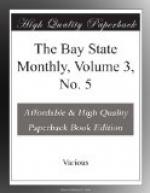September 16.—Rev. Benjamin F. Tefft, D.D., LL.D., a widely known Methodist divine, died, aged seventy two years, from a shock of paralysis received on Friday. He was one of the ablest pulpit orators in the denomination, has been a president of the Genesee College, editor of the Methodist Book concern and author of several works. He was a member of the New York Geographical and Statistical Society, the Society of Arts of London, etc. He was United States consul to Stockholm in 1862, and acting minister to Sweden, and commissioner of emigration from Europe to the state of Maine in 1864. He has been in poor health the past two years. Dr. Tefft was the author of “Evolution and Christianity,” published last Spring, a veritable encyclopaedia of Evolution-lore.
* * * * *
AMONG THE BOOKS.
A very notable contribution to the annals of our times is the publication of the Writings and Speeches of Samuel L. Tilden[2] This contribution is comprised in two volumes, and is so complete in itself as to ensure a welcome from not only a large body of political sympathizers and admirers but also from all students of American political history. Mr. Tilden has the honor of being unquestionably the greatest Democratic leader of recent years, and, in more ways than one, of being a unique figure among the statesmen whom his country has produced.
He was born in New Lebanon, N.Y. 1814, and before he reached his majority he began to discuss political questions in print and on the rostrum. In these early, as well as in later years, he was in his instincts a conservative; as time moved on, he grew more and more fond of the democracy of Jefferson and of Jackson, and their democracy, it may be said, has had, during the past quarter of a century, no more devoted or worthier expounder and representative than Mr. Tilden. No question of paramount interest has arisen that has not, from the Democratic standpoint, received his attention. When the nullifiers assaulted the Union he stood by it; whenever anybody has undertaken to advocate the American “protection” system, he has invariably denounced it as unconstitutional, in this respect differing from another leading Democrat, General Butler. Mr. Tilden also stood by the removal of the deposits from the United States Banks, advocated the establishment of the Sub Treasury, and was the first to contend for free banking. He asserted the supervision of legislatures over charters of their own creation. He protested against the nationalization of slavery in 1848.
These few specifications of a general character, to say nothing of those of special interest, indicate something of the wealth of thought and expression contained within the covers of these volumes. Of the minor themes, one was exceedingly important in its day, and important also as a lesson for future municipalities,—namely, the Tweed charter for New York city and the story of the destruction of the Tweed ring. It is herein presented with the fullest details.




